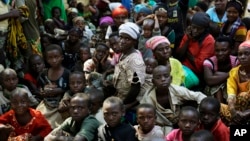The aid agency Oxfam says more than 70,000 refugees from Burundi have crossed the border into Tanzania fearing political violence at home. Aid agencies are seeking more support as disease and overcrowding take a toll on the refugee population.
Most of the new arrivals in Tanzania are women and children. They crowd the beach at Kigunga on the shore of Lake Tanganyika – which borders both Burundi and Tanzania -- waiting for transport to another refugee camp.
Oxfam communications officer Aimee Brown, working in Tanzania, described desperate conditions at Kigunga.
“It's a very thin strip of beach that's about 800 meters long and behind it is a high mountain, so it's very very cut off. It's rocky, sandy beach and people are living right on the beach all the way down to the water, waiting,” she said.
Most of the refugees who have crossed the border in the past three weeks have been relocated to the Nyarugusu camp through another transit center.
Brown said the influx was putting a strain on humanitarian agencies.
“Currently now at the refugee camp there is also overcrowding, as the camp is above its capacity and also as aid agencies struggle to get enough equipment to respond to the needs of the new arrivals,” she said.
The most urgent need, she said, was shelter – tents to accommodate families, many of whom are now staying in churches and schools. Clean water is also needed as well as the tanks and purification chemicals needed to store and treat it.
Cholera
Health is another major concern. The United Nations refugee agency (UNHCR) has already reported 3,000 cases of cholera, with up to 400 new cases each day.
Driving this refugee crisis is a pervasive sense of fear, as thousands flee from a volatile political conflict in Burundi.
Burundian President Pierre Nkurunziza's controversial bid for a third term has prompted massive street protests, deadly clashes with the police and an unsuccessful coup attempt. During the weekend, an opposition leader was assassinated in the capital, Bujumbura and at least three people were killed in a grenade attack.
Brown said when asked why they have fled, refugees typically gave one of two responses.
“The first one is that people have either received direct threats to themselves or their family members, or report that family members of theirs have been killed. Then the other group of people say that they're fleeing almost preemptively, they feel like war is about to start, to use their own words, and they want to get out before that happens,” she said.
Agencies working on the ground, including Oxfam, have jointly asked for $91 million in funding to address the growing crisis in Tanzania up until September.
More than 26,000 Burundians have also fled to Rwanda and nearly 10,000 have crossed into the Democratic Republic of Congo since April.




